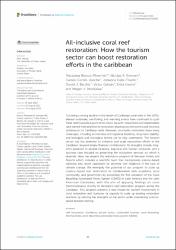| Sinopsis: | Following a strong decline in the health of Caribbean coral reefs in the 1970s, disease outbreaks, overfishing, and warming events have continued to push these reefs towards a point of no return. As such, researchers and stakeholders have turned their attention to restoration practices to overcome coral recovery bottlenecks on Caribbean reefs. However, successful restoration faces many challenges, including economical and logistical feasibility, long-term stability, and biological and ecological factors yet to fully understand. The tourism sector has the potential to enhance and scale restoration efforts in the Caribbean, beyond simple financial contributions. Its strengths include longterm presence in several locations, logistical and human resources, and a business case focused on preserving the ecosystem services on which it depends. Here, we present the restoration program of Iberostar Hotels and Resorts which includes a scientific team that incorporates science-based solutions into resort operations to promote reef resilience in the face of climate change.
|
| Autor(es): | Blanco-Pimentel, Macarena
Evensen, Nicolás R.
Cortés-Useche, Camilo
Calle-Triviño, Johanna
Barshis, Daniel J.
Galván, Víctor
Harms, Erika
Morikawa, Megan K.
|
| Año: | 2022
|
| Publicado: | Frontiers in Marine Science, 9, 931302
|
| Citación: | Blanco-Pimentel, M., Evensen, N. R., Cortés-Useche, C., Calle-Triviño, J., Barshis, D. J., Galván, V., ... & Morikawa, M. K. (2022). All-inclusive coral reef restoration: How the tourism sector can boost restoration efforts in the Caribbean. Frontiers in Marine Science, 9, 931302. Recuperado de:
|
| URI: | https://bvearmb.do/handle/123456789/1554
|


